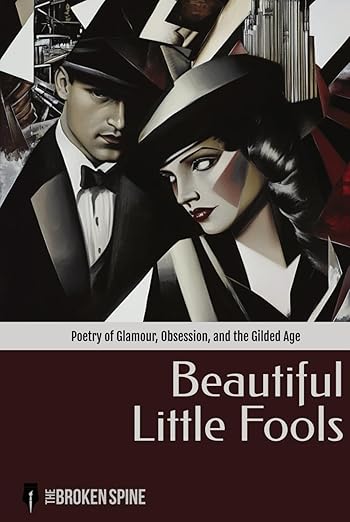The New Samizdat

At the Corner of Hope and Despair: An Anthology for the Trump Era
Charlotte Muse, Chris Cummings and Patrick Daly, eds.
Pope Street Press
ISBN-13: ? 979-8218526832
Beautiful Little Fools: Poetry of Glamour, Obsession, and the Gilded Age
Alan Parry & Karen Pierce Gonzalez, eds.
Broken Spine Ltd.
ISBN-13: ? 979-8288199141
Once upon a time, in a galaxy far, far away, there lived poets and writers whose lives were often endangered by a large, malicious bureaucracy whose only purpose was to frustrate any expression of change or freedom. The leaders of those societies (Darth Hitler, Darth Mao), determined to maintain their hold on power, found enemies everywhere, internal enemies as well as external, warning their citizens of the dangers that surrounded them. They, the citizens, didn’t have much, but what they had (their clothes, their pitiful homes, their families, their pitiful lives) would be taken from them if those enemies ever came to power. But wait, isn’t that true of many modern Earth societies?
I don’t know about you, but the things the nuns, priests and politicians used to warn me about in grade school—especially Russian and Chinese totalitarianism—seem to have taken root here, in our precious, freedom-loving U. S. of A. I don’t plan to spell out the details, the various goose steps we’re taking on the road to fascism. Read the papers. (Maybe not WSJ or USA Today.)
Read the poets.
Remember what William Carlos Williams used to say: “It is difficult to get the news from poems, yet men die miserably every day for lack of what is found there.”
With that in mind I picked up a couple of recent anthologies, gatherings of poets aghast at the state of so-called Western Civ. One, At the Corner of Hope and Despair, published on America’s Left Coast by a small group of hopeful individuals, is conceived as an “An Anthology for the Trump Era.” The other, Beautiful Little Fools, a title taken from The Great Gatsby, was published in the U.K., its subtitle, “Poetry of Glamour, Obsession and the Gilded Age,” pointing to its relevance to the current Gilded Age, an era dominated by despot plutocrats.
Let’s start with At the Corner, a volume published what seemed like minutes after Trump’s second election. How have we come to such a pass, the editors ask? How have we managed to ignore all the struggle and suffering that is our recent patrimony? At the beginning of the prior difficult century V.I. Lenin wrote a short pamphlet entitled “What Is To Be Done?” At the beginning of another century, short and already difficult, poets Charlotte Muse, Chris Cummings, & Patrick Daly have conjured a chapbook that might be titled “What Can Be Done?” The shift in tone—from the aggressively programmatic to the anxious and tentative—hints at the disappointments of recent human history. Perhaps you are unsure of your place in society. Perhaps your ideological bedrock is shifting underneath your feet. Then perhaps these poems will give you the courage and confidence to continue.
Many of the poems in this volume adhere to current poetic conventions, offering imagistic narratives, many of them very powerful, which describe the horrors perpetrated by Trump and his cronies. But of course there are other ways of deflating a swollen dictator-wannabe. We remember that some of the earliest poetry in the Western Canon swerved from the celebration of the mighty and victorious, to sympathy for their victims (Hector and Priam in the Iliad) or to burlesque, parody and satire (which, as in our present day, could have lead to your disappearance). One of my favorite pieces is Charlotte Muse’s re-write of Leonard Cohen’s (lovelorn) “Suzanne”:
Trump takes you down to his place near the ocean
You can play a little golf there, you can hear his self promotion
And you know that he’s half crazy and that’s why you want to be there . . .
And just when you mean to tell him that you think he’s full of bullshit
Then he gets you on his wavelength and he wishes to remind you
He’s been many women’s lover
(“Song”)
Another poem by Muse, “Small Ode to Joy,” provides a glimpse into neglected and overlooked corners of life: “Hurry,” she tells us:
The redbud won’t wait , or the freesia,
or the silver-bark cherry. All the new webs,
shining and floating like unrounded bubbles,
won’t wait.
There are riches all around us, silver and shining; all we have to do is notice them. All we have to do is turn away from our screens and the hectic pageant of our politics:
We don’t owe everything to madmen who think
we’re only empty shoes in the jig with death.
We don’t owe everything to sorrow.
On a parallel track, Iranian American poet Esther Kamkar engages the great mysteries—you know, life, the universe, and everything—but settles on a direct confrontation with feeling:
How to press our heart against
the great broken heart of the world
without understanding,
without turning away.
(“Question as Shelter”)
Probing deeper philosophical ore, Mary Dederer surveys “Ancient Maps,” and notes that, despite all our knowledge and planning, the world eludes our desires, our designs. “The wind does what it pleases . . . ,” she tells us, “folding intention back on itself, / the whole world sputtering, wincing, / and starting all over again.”
And latter-day Beat Terry Adams offers a disarming conversation with a rock, one that might remind us of Polish poet Wisława Szymborska. “If I Were a Rock,” he laments, “I’d worry / whether I was the right rock, lying in the right place . . . . I would hope to be moved to allow / a passage to peace, // or stacked / with my brothers / to point the way.”
One finds moments like this, of whimsy, consolation and hope, throughout this wonderful little book.

The second volume under review, “Beautiful Little Fools,” approaches our current political crisis from a different angle, but also offers a richness of variety and insight. Why an anthology centered on The Great Gatsby, now a century old? According to the editors: “The simple answer is: because The Great Gatsby is a remarkable cultural artefact. Flawed, fabulous, unrelenting. It speaks volumes about the society it was created by, for, and about. And like any serious object of cultural value, a carved bowl in an Amazonian rainforest, a Nike trainer laced by a teenager, it deserves interrogation.”
And what kinds of questions do these poets ask of the hallowed text? Questions about wealth. Questions about power. Questions about care and carelessness. Questions about innocence and guilt.
“The Woman at the Party with Her Entourage” is unhappy with her privileged lot. Zen abbott Richard Collins peeks into a soul in which emptiness (not the good kind) has come home to a “cluttered house full of beautiful objects.” Once a celebrated violinist, she is still sought after but not by those she herself seeks. “Parties are such sweet sorrow,” she tells a fellow party goer, wryly echoing Juliet. And memory is no balm:
. . . not long
ago she had a brace of poets among
her beautiful objects read to her.
They put everything in their mouths
(including her) and left the house
(and her) in ruin.
With Jazz Age nonchalance, Susan Richardson (in “The Drowning”) tosses Gatsby’s vocabulary into a cocktail shaker, shakes it, and then arranges it in prescient lines:
Slippery thumbs toss trinkets at jewelled mirages
suspending dreams in patches of stale whiskey breath.
Pearls sink like chipped teeth to the bottom of crystal tumblers.
As with any enterprise dedicated to a writer known for his stylistic flourishes, one finds ornate and euphuistic vocabulary, things like “A silky velvet evening bag / With sequins that twinkled” (“Message from the Stars”); or like this meditation by James Lilliefors on visiting Fitzgerald’s grave in Maryland:
I felt darkness softly rain down, the night’s message
pooling into a conviction that I would take with me,
and keep, in diminished form, for the rest of my life
(“Rockville”)
Of course, adherence to one’s hero can be perilous as well. One notes the occasional strain of barely tamed misogyny, as in Paul Short’s “Depraved New World”: “All these pretty dancing girls. Sequin-stitch smiles / and beaded dresses that rattle and swish on approach.” And yet the editors also find room for Claire Painter’s sympathetic portrayal of “Tom’s Girl”: “She straightened up her / dress, lifted her chin just so and took up that great, wide carelessness / that breezed and drifted through them all.” Myrtle has her own aspirations, no better and yet no worse than her wealthy boyfriend, or his wealthy wife.
Every generation invents or re-invents the classics. Did Fitzgerald care about the evils of racism? Not as much as David Birch who in “Atlantic Crossings” describes how black musicians, the inventors of the Jazz Age, fled the oppression and violence of their homeland: Louis Armstrong, denounced as an ‘untrained gorilla,” but also Parker, Gillespie, Holiday—“voices of the dispossessed.”
If one were to do a structural analysis of this volume, one might note how often these poems rely on the positing of binary opposites for their mise en scène: wealth vs. poverty; rich & elegant v. cheap & tawdry; lofty & sophisticated v. animalistic. Is this a proxy for dramatic tension, a lo-cal substitute for the full fat of real drama? Or can we take the book as an allegory for our current era, in which wealth substitutes for real accomplishment, ability and concern. The pleasures of such a volume are many, but when we turn the last page, we must turn again to our lives, thwarted like Gatsby’s by our dreams and the inexorable pressures of our times.
Finally we must ask ourselves if we are the kind of people chided by Jennifer Leong in “on their part, they threw parties”:
Simply put, they really couldn't care less ---
Though "carefree" was the term they preferred
Lee Rossi is a Portside moderator.
